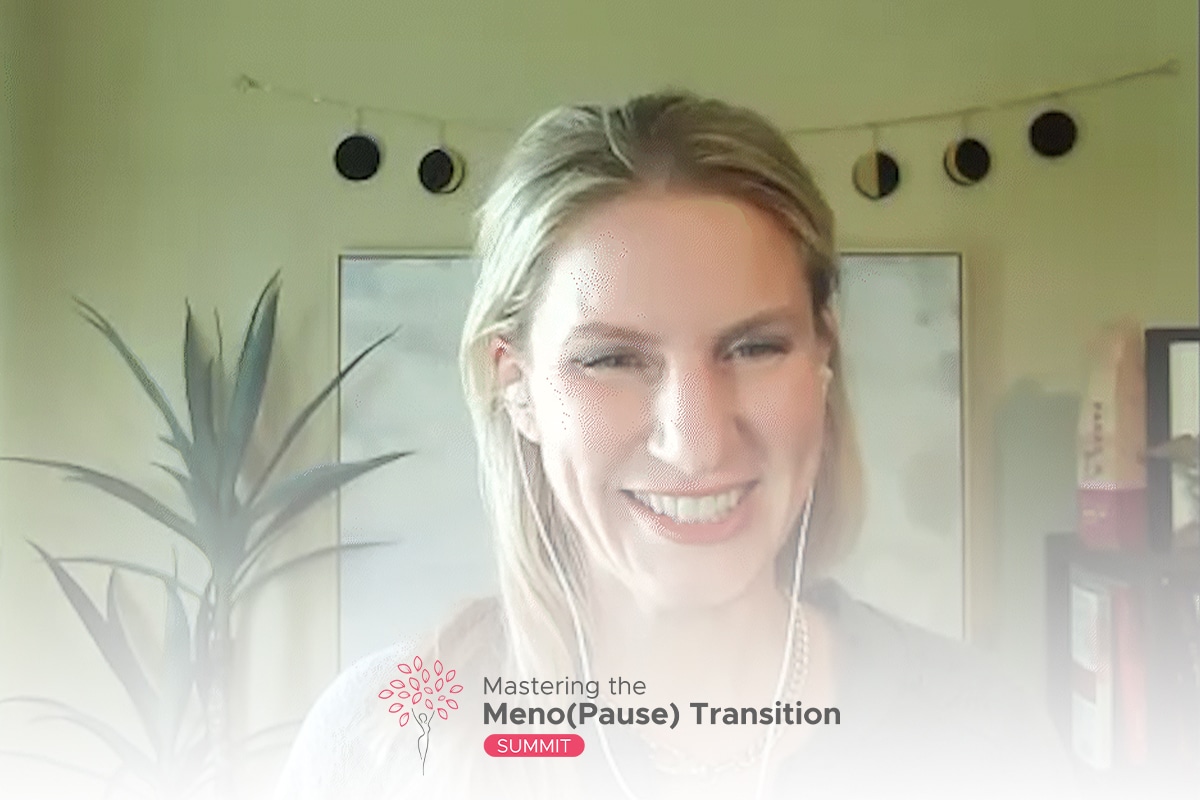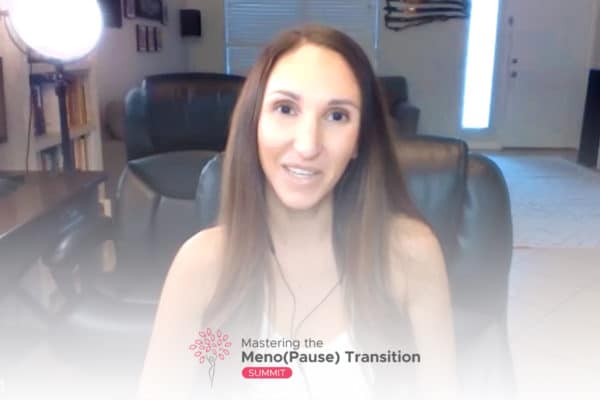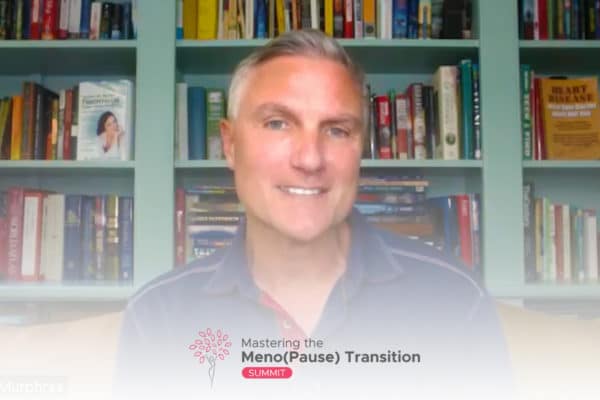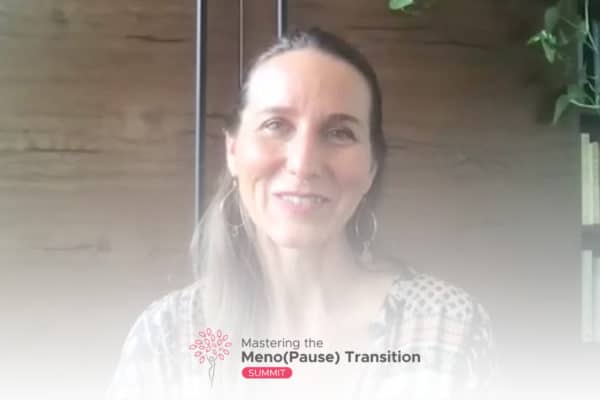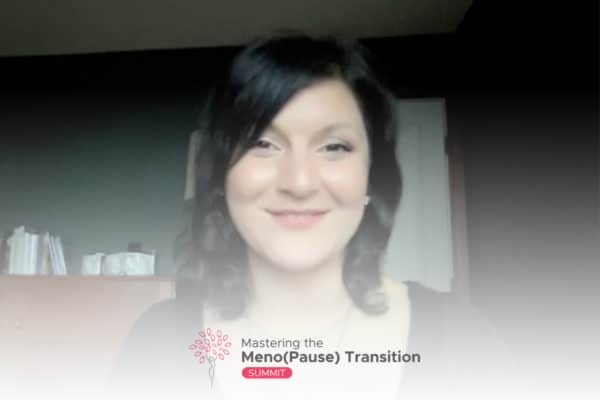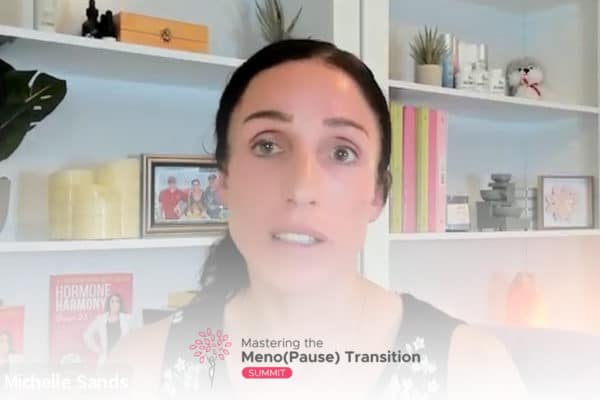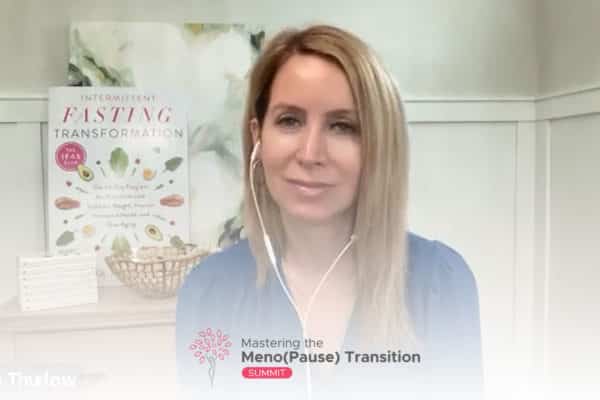Join the discussion below
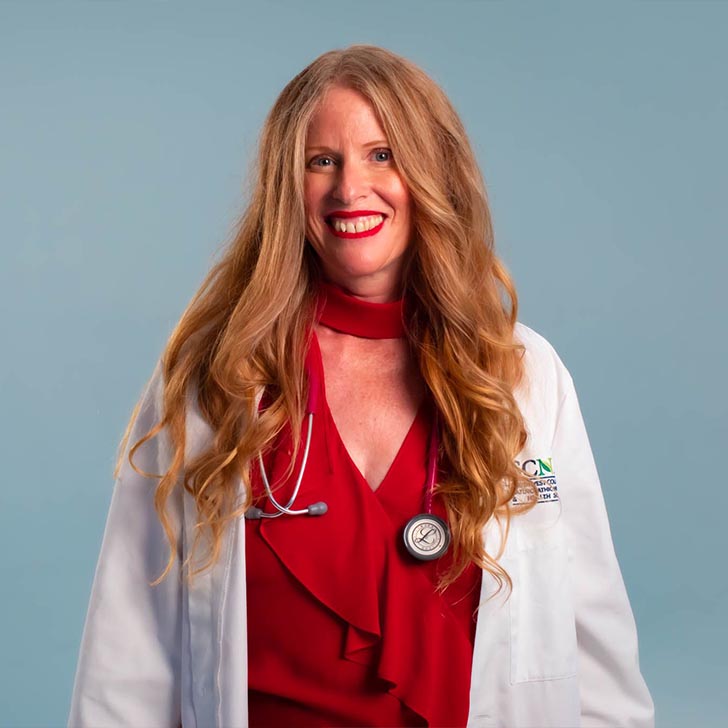
Dr. Sharon Stills, a licensed Naturopathic Medical Doctor with over two decades of dedicated service in transforming women’s health has been a guiding light for perimenopausal and menopausal women, empowering them to reinvent, explore, and rediscover their vitality and zest for life. Her pioneering RED Hot Sexy Meno(pause) Program encapsulates... Read More
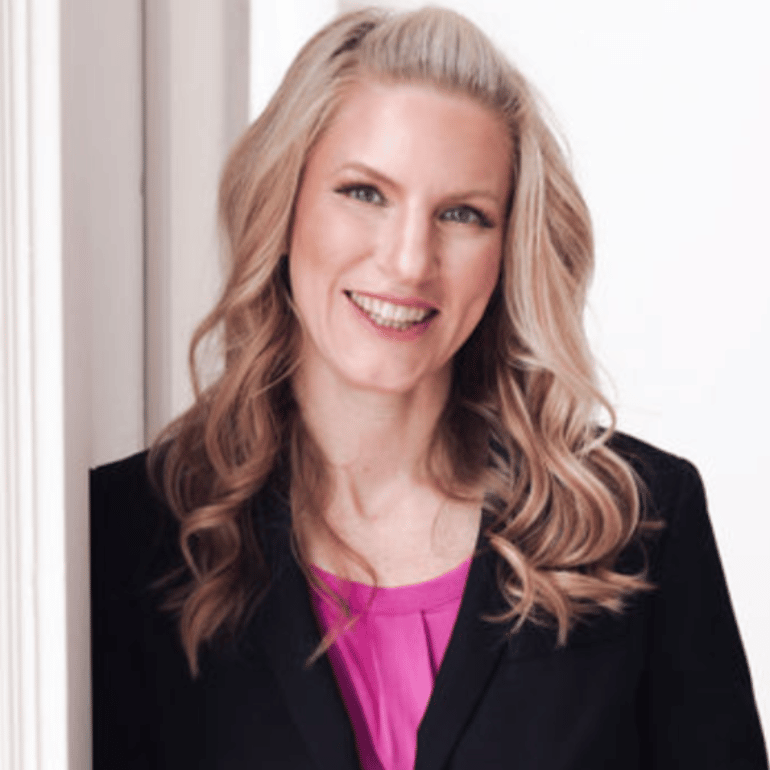
Carrie Jones, ND, FABNE, MPH is an internationally recognized speaker, consultant, and educator on the topic of women's health and hormones with over 20 years in the industry. Dr. Jones graduated from the National University of Natural Medicine in Portland, Oregon where she also completed a 2-year residency in women's... Read More
- What exactly is estrogen detoxification or metabolism?
- In menopause estrogen declines, so why do we need to worry about estrogen detoxification?
- Are there certain foods or supplements that help at each step?
Dr. Sharon Stills
Hey, ladies, we’re back to Mastering the Menopause Transition Summit. Still your host, Dr. Sharon Stills, here with the hormone queen. You ladies are in for a treat. We’re probably gonna get a little science-y. So, grab a pen, grab paper, you might wanna take some notes. This will definitely be one you’re gonna wanna listen to again and again, because my guest today, I’m sure many of you already know who she is, is Dr. Carrie Jones. She’s an internationally-recognized speaker, consultant, and educator, on the topic of women’s health and hormones with over 20 years in the industry. She is a naturopathic physician, just like me. She graduated from National University of Natural Medicine in Portland, Oregon, where she also did a two-year residency in women’s health, hormones, and endocrinology. She was the medical director for DUTCH, now she is the Medical Director of Medical Education at Rupa Health. She’s the host of “The Root Cause Medicine Podcast.” She’s a clinical expert for Lifestyle Matrix Resource Center. She is lots of things. If you’re not checking out her Instagram, you are missing out ’cause not only is she knowledgeable, but she’s also very funny and has great Instagram reels. So I highly recommend checking her out. So, welcome, Carrie, it’s so good to have you here.
Carrie Jones, ND, FABNE, MPH
Thank you so much for having me. I’m excited.
Dr. Sharon Stills
Yes. So, we are talking all things menopause, and today, we’re gonna do a deep dive. We’ve been talking about estrogen, we’ve talked about how estrogen gets a bad wrap and actually when utilized properly, it can be very healing and is very necessary through the menopause transition. We’ve talked about how I even use it for breast cancer patients, and that we just have to really understand the different kinds of estrogens. But today, we are gonna talk about detoxification and metabolism of estrogen, which is really, really important to know. So, I guess before I even asked you about that, I’d love for you to just tell, like, how did you get so into hormones? Do you have a personal story?
Carrie Jones, ND, FABNE, MPH
I have a funny story actually. So, I grew up in Kentucky. I wasn’t born there, but I was raised there for a lot of the formative years. and my health, sex-ed type classes were taught by the football coach, so you can imagine how that went. And when I got into college, I had known for a long time I wanted to be a doctor, but I got more and more into women’s health, I got more and more into community outreach, community education. I was volunteering at two different hospitals, one was in their community outreach and I just loved it. So when I found naturopathic medicine, I continued all in the lines of women’s health and hormones. I had a fantastic mentor who I was able then to do a two-year residency with her and just got a lot of hormone experience through my connections with her. And I found just over and over and over that as I was learning this stuff, I had so many friends, our family, neighbors, and eventually when I got my license, my patients who were like, “I didn’t know this, I didn’t know this.”
I would have women that are like, “I’ve had multiple children, didn’t know this.” I’d have menopausal women who were like, “Didn’t know this. I don’t know how I survived ’cause I didn’t know any of this.” I’m like, “Oh, that’s a problem.” So my story was I just kept learning, learning, learning, learning, and I found so many friends, patients, colleagues, etcetera, who were like, “I don’t really understand this whole hormone thing, and I would really like for you to educate me on it.” In fact, the other day, a good friend of mine is a double board-certified internist gastroenterologist. And she’s like, “Can you just run me by the menstrual cycle real quick?” She’s like, “It’s not what I deal with, right? Like, I’m GI,” Handle the menstrual cycle. But she’s had children and she’s female, and she’s so funny. And I was like, “Yeah, I’ll run you by the menstrual cycle. I’ll tell you what happens, hormonally.” And I find that’s just the case with so many women, they just don’t know.
Dr. Sharon Stills
Yeah, and especially in medicine, why naturopathic medicine shines because we embrace all of you, and that is so true that a gastroenterologist, why would they know what the menstrual cycle is? They haven’t probably thought about it in 20 years-
Carrie Jones, ND, FABNE, MPH
Yeah. No, not at all. And she’s branching and she’s doing all sorts of hormone stuff now. But she realized really quickly like, “Oh, this is not the intestines. Like, this is a whole different world I need to focus on.” Yeah, wait until they transition to menopause, then it’s a whole different world.
Dr. Sharon Stills
Exactly, exactly. So great, I love your story. Estrogen and detox and metabolism, what do these ladies need to know?
Carrie Jones, ND, FABNE, MPH
Yes. So, I got really into estrogen metabolism when I worked at the hormone test company, the DUTCH Test, because it’s one of the factors we tested. And as they dug into the studies around estrogen and cancer, or even non-cancerous related, but estrogen-related symptoms, breast tenderness, heavy periods, polyps, fibroids, worsening endometriosis, et cetera, et cetera, one of the things that kept coming over and over was, well, how do you get rid of your estrogen? Like, you make it, so how do you get rid of it? And so, the act of detoxifying or breaking down hormones is known as metabolism. And what it breaks down too are called metabolites. And some of the metabolites are helpful and good for the body. And some of the metabolites are not so much, not so helpful at all.
And your body goes through these different phases of detoxification, we have two or three, depending which pathway your estrogen goes down. As it’s going down this pathway, what can happen is women will say, especially maybe younger, they’ll be like, “I just always felt, now that I know, I always felt I had high estrogen. I had all the symptoms you just said. I had bad PMS, I had heavy periods, I had fibroids, et cetera, and nobody could really answer it for me. My OBGYN didn’t know, my primary care didn’t know. I was handed the birth control pill to just shut it off.” I was like, “Fair enough,” because that’s all they’re taught for the most part. But really what’s helpful to understand is why I bet you weren’t getting rid of it in a healthy manner. I bet we needed to improve the pathways that you get rid of estrogen, which is really nice to know for menopausal women who are listening to this going either on estrogen or thinking about going on estrogen, then now they have this extra amount of education to go, “All right, great, you’re on it.” Or “You’re gonna take it. Now, let’s get it to clean out in a healthier manner.” And so that’s why I love talking about it so much.
Dr. Sharon Stills
Mm, so important. Yeah, sometimes we think about, you are what you eat, but then we remember, no, you’re really what you absorb. And so, with hormones, like, you’re taking them, but now what? What’s your body doing with them? Which is why I freak out when someone comes in and they have never had a urine test to look at their metabolites, and their hormones are just being monitored by blood, which not a good, accurate way to take care of things. So let’s talk, what are those pathways? What do the women need to know?
Carrie Jones, ND, FABNE, MPH
What do they need to know? So I’ll walk you through-
Dr. Sharon Stills
Your bathtub analogy.
Carrie Jones, ND, FABNE, MPH
I was just gonna say, we’ll start with the bathtub. So, I thought of this analogy years ago and I’ve just always used it. So picture a clawfoot bathtub, and it has to be clawfoot ’cause I’m extra and I want a clawfoot in my analogy. So you can’t ever turn off the water. Your bathtub is always going in your body. Detoxification in your body is 24/7, 365. It doesn’t turn off for your birthday, it doesn’t turn off for Sunday, it doesn’t turn off for Christmas or Hanukah, none of that. It happens every day. So when people say to me, “Well, I wanna do a three-day cleanse,” or, “I wanna do a seven-day cleanse,” I’m like, “Well, and then what? What happens on the fourth day or the eighth day?” Like, it never shuts off. So in my bathtub analogy, water is coming into your bathtub, you can never shut it off. You can adjust it, but you can’t shut it off. That’s what we call phase one estrogen detoxification. Your phase one estrogen detoxification is three different types of water, which are three different pathways it can go down.
And thankfully they’re numbered to keep it easy. So it’s the two pathway, it’s the four pathway, and it’s the 16 pathway. So the two pathway’s the better pathway, it’s like less bad. It’s not perfect, but it’s less bad. The four pathway is bad, it’s straight-up bad. If you’re going down that pathway, you have what’s called risk for DNA damage. And we surely do not want to damage our DNA in any way possible. The 16 pathway is what’s called proliferative. It makes things grow. Great for bones, prevents against osteoporosis, especially as we head into menopause. Bad for breast cancer. We don’t want 16 to be the dominant pathway, God forbid, if your cancer cells are going wild. So that’s the water in phase one. Then you have to go through the drain ’cause the water comes into your bathtub, go through the drain. So now the question is, is your drain open? Is your drain closed? Is your drain clogged? Is your drain open but not open wide enough?
So as that 2, 4, and 16 are coming in, all that water is coming in, you don’t want your drain to be closed or clogged because just like in your bathroom, which the water will overflow and ruin your bathroom, the same thing happens in your body. You get this overflow of hormone that could be toxic and we don’t want. Then once you go through the drain, you go to the sewer line, just like in your house or your apartment or your condo. So now you connect to the sewer line and you get excreted away. It goes to the city or it goes somewhere, but it’s not in your house anymore. And it’s the same in your body. So it either goes to the kidneys and you pee it out, or it goes to your intestines and you poop it out. But as you can imagine, you can have issues there too. So for people who were not drinking enough fluids, if they have kidney disease, if they have constipation, they have a lot of intestinal gas and bloating, and maybe they have a history of parasites or worms or things that are causing their microbiome, they’re the gut bugs that live down there, will all affect the way your estrogen gets out.
Just like in your sewer line in your house or your apartment, if it’s clogged or cracked, then obviously you’re gonna still have bathroom issues because the out isn’t out. So the analogy is the same in your body. So, the bathtub, I explain it, water to the drain to the sewer line, but the way you wanna fix it, just like in your house or apartment, is fix your sewer line first, then open your drain and then adjust your water. So in your body, we wanna make sure you’re hydrated. We wanna make sure your kidneys are healthy. We wanna make sure you’re pooping regularly. We wanna make sure your microbiome is healthy. And then the drain part, the drain part in the body is one of three things. It’s either called, and they’re big words and they have to do with… They’re like Cinderella’s fairy godmother, they transition things. So one is called methylation, one is called sulfation with an S, and one is called glucuronidation.
Now, who named these? I don’t know. I always joke, if I was in charge, I’d name them like OPI Nail Polish. It’d be, like, really fun, memorable, cute names, right? So in your body, you do these things. And the reason is the drain in your body is a neutralizer. It makes things in your body neutral. So if you have bad chemicals or bad hormones wreaking havoc, it’s like “Uh-uh, nope,” and it magically transforms it into something neutral that can’t cause problems, and what we call water soluble so you can get rid of it. You can pee it out or you can poop it out. And then, of course, we have, like I said, the water. So in our body, I’m constantly working with women to say, “How are your kidneys? How are your intestines? Tell me about your bowel movements.” You know, everyone loves to talk about that. And then I’m doing testing to see, can you neutralize this estrogen? And then what pathway are your estrogens going down?
The 2 pathway, the 4 pathway, or the 16 pathway? Now, this sounds like a lot, this can be super overwhelming for somebody to hear it for the first time. And what I want you just to take home is to know that if you are fearful of estrogen or maybe you’re on estrogen or worried about estrogen, or maybe you had all the estrogen symptoms I said, when you were younger, know that we, us practitioners, who know this stuff, know that we can use supplements and we can use lifestyle, and we can use foods to adjust you to going out the right pathway, which is so nice. You know, like, how nice would this have been to know so much younger? Like, hey, did you know one of the key bonus nutrients of your drain section of your body is magnesium? Like, hey, one of the key nutrients in the sewer line section. And, you know, your intestines, think of like your prebiotics and your probiotics, and your postbiotics. One of the key factors in the water section are the brassica family, specifically broccoli, kale, cauliflower, and even better, broccoli sprouts. Broccoli sprouts contain an enzyme that mix with another nutrient, that they form something that’s big and long, it’s called sulforaphane. Sulforaphane is like this magical drain cleaner.
It completely just opens up the drain like no tomorrow so you can get estrogen out. And how nice is if we got taught a long time ago, like, hey, put some sprouts, eat some sprouts every other day, you know? Like, hey, make sure you’re getting enough magnesium in your life. Like, hey, are you pooping every day? You’re not? Well, that’s gonna affect your estrogen. So let’s make sure that the microbiome is okay. It’s basic stuff. None of it’s medication, none of it requires surgery, nothing’s… Insanity, I just wish this stuff would get taught and it would just help us, especially heading into perimenopause and menopause, it just feels so much better about, like, okay, I’ve got this under control, I can control my own bathtub, I can work with my own estrogen and get it out easily.
Dr. Sharon Stills
I know, and so many women, and that’s why I’m doing this summit, because so many women suffer for no reason because solutions are here. We understand them. Unfortunately, they’re not in your OBGYN office right now, or they’re not in your primary care’s office. And so, when it comes to hormones, you really need to go to a naturopathic physician who really understands this. And I love what you said, it’s not their fault. It’s just they’re thought differently. You can only see what you’re trained to see. So if you’re-
Carrie Jones, ND, FABNE, MPH
Yes.
Dr. Sharon Stills
And you’ve got blinders on, that’s all you see, you only see medications, you only see suppression. And it really is a beautiful system. And I love the bathtub analogy. And now I wanna rename the phase two detox pathways and start looking at my nail polish bottle.
Carrie Jones, ND, FABNE, MPH
Wouldn’t that be so much easier to understand if somebody… People are taking notes, like, how do you spell glucuronidation? I’m like, “I know, even I have to spell check it sometimes. It’s a crazy word.” Yeah, yeah.
Dr. Sharon Stills
So for women listening, because we know that menopause, we know estrogen declines. So if someone is listening and they’re like, “Well, do I need to really worry about this? ‘Cause I don’t even have any estrogen.” What would you say to them?
Carrie Jones, ND, FABNE, MPH
Yes, so here’s the thing, again, going back to my first point, detoxification never stops ever. So even if you went from an abundance of estrogen in your younger years down to low menopausal levels, now that you’re transitioning, even that menopausal level is still going through detoxification. So even though the water amount coming into your bathtub is less, if you are going down the naughty, little four pathway that causes DNA damage, all it takes is one, and then the snowball effect happens. So I don’t want to increase the risk of anybody’s potential for, let’s say, like, a breast cancer or an endometrial cancer, which can be estrogen-related as they get older. Now, the thing about cancer is we know is it’s complicated. We cannot ever single-handedly blame breast cancer on estrogen, right? It’s not like this one hormone did it. It’s the guilty dog, you know? Like, that’s who did it. It’s just not possible.
But we can say one of the contributing factors might be that if you are going down this pathway and you are routinely, like, picking on DNA, picking on DNA, picking on DNA, causing damage, then you’re at an increased risk for DNA mutation. And we don’t want mutation ’cause one of the mutations could be cancerous in nature. So even as women get older, your exposure to chemicals, your exposure to life because of age, is increasing, even though your estrogen’s decreasing. So I still wanna reduce your risk every way that I can. I still wanna get your estrogen out while I’m working on all the other stuff in their life. So, yes, even if they’re choosing not to do any estrogen and just to have the estrogen as is, eat broccoli sprouts, make sure your magnesium is good, make sure you poop every day, like, these things can still be quite helpful for you.
Dr. Sharon Stills
So, with the four metabolite which does the DNA damage, are there other things other than the broccoli sprouts, some of your favorite things that women be aware of that you could share?
Carrie Jones, ND, FABNE, MPH
So one of my favorites… Well, actually I’ll tell you what’s the most common and then I’ll tell you why you have to be careful in menopause and what I’d use instead. So the most common thing you’re gonna read about in blogs or social media is what’s called DIM, D-I-M, or indole-3-carbinol, I3C. So again, who names these? I don’t know. So DIM… So indole-3-carbinol turns into DIM, and so you will sometimes see them both on a supplement. Sometimes you’ll just see one or the other. So what they do is they pivot the pathway. So if you are sliding down the four pathway water slide, it will pivot you to slide down the two pathway, which is way better. So that’s great. But what it does in the process is it lowers estrogen out of circulation. It, like, grabs estrogen as it goes. If you are younger and you have an abundance of estrogen and you want less of it, then that’s when you should use it. So when you were in your 20s or 30s or maybe even your early 40s, and you were feeling so estrogenic, that’s the perfect time for DIM.
What’s not perfect is if you’re already menopausal and low in estrogen, I don’t want your estrogen any lower ’cause I don’t want your bones to be affected, your brain, your heart. I don’t want you to have hot flashes and hate me. So just be mindful if somebody said, “Oh, you’re on estrogen, take DIM,” eh, maybe, but it will lower your estrogen out of circulation and push it down to the better pathway, the two pathway. So it’s like one good thing pushes it down the two pathway, but also lowers it out of circulation. So what do I like instead? I like resveratrol. So I like resveratrol, which is better instead. And the other option you can try is quercetin. So quercetin starts with a Q. And resveratrol, I like better because it has less domino effects in other parts of the body against estrogen. So quercetin is great for the water, adjusting your water away from the four pathway, but it will clog your drain. So you’re like, “Dang it.”
So then we have to do more drain support. So I don’t recommend quercetin all that much unless you’re working with a practitioner who knows what they’re doing and is like, “I got you. I’m gonna give you more drain support over here to counteract the effect of quercetin at the drain, but I still want it for your water slide effect.” So resveratrol, I like, because it doesn’t affect the drain. It doesn’t affect the sewer line out, the intestines or the kidneys, it’s generally considered pretty safe. And so that’s why I tend to like… and it’s pretty easy to come by, trans-resveratrol. So that’s a really nice one. And then again, I’m gonna go back to the broccoli sprout, the active ingredient in broccoli sprouts is called sulforaphane. So, if you’re listening to this and you’re like, “Ooh, but I’m one of those menopausal women with low estrogen, I don’t know that I want to change my estrogen and circulation. I don’t want hot flashes and night sweats, and affect my brain and my heart.” So then you’re probably the better candidate for eating a couple pinches of broccoli sprouts every other day or so, or buying broccoli sprout supplement, ’cause what that does is that broccoli sprout has the ingredient, it makes sulforaphane, with an S, and it opens up the drain.
So no matter what, water is coming in, 2 water, 4 water, 16 water, the body doesn’t care, it just opens the drain and pushes it out. So it just takes care of it for you. And it also helps if you’re headed down the pathway towards DNA damage, it will redirect it away from DNA damage. So those broccoli sprouts are pretty slick. And I do get asked, like, “Well, why don’t you eat them every day?” Or “Should I eat them every day?” Unfortunately, because there’s not a lot of money, there’s no money from broccoli sprouts, it’s not well-studied and so not all broccoli sprouts are the same, meaning maybe you bought heirloom seeds, which have what we call a high yield. They’re like really great, but maybe you just bought these regular old, organic broccoli seeds and you’re growing your own sprouts at home.
But we don’t know what the yield of that sulforaphane is. So I don’t know if it’s potent or not. But research has shown us that once you activate the drain, the time it takes to close again or slow down again is many… like, I think it’s up to 18, 24 plus… I mean, the researchers are like, “The drain doesn’t close immediately.” So if you eat broccoli sprouts on a Monday and then you don’t need eat them again on a Wednesday, like, it probably takes that much time for you to go up and then back down again. And so I was like, “Great,” ’cause not everybody likes broccoli sprouts. Sometimes they don’t taste all that great, right? They’re those little microgreens. So, resveratrol is an option, and then sulforaphane, which is in broccoli sprouts is a really good option.
Dr. Sharon Stills
I’m so glad you brought up the DIM because I, throughout the years, have seen so many women be so confused about DIM. I’ve had so many patients come in who think, “I’m taking estrogen because I’m taking DIM.”
Carrie Jones, ND, FABNE, MPH
Oh, yeah, yeah.
Dr. Sharon Stills
I’m like, “Spin that around.”
Carrie Jones, ND, FABNE, MPH
You’re, like, “Actually, actually…”
Dr. Sharon Stills
Or just taking it because they think it helps. But that’s why it’s so important. We always say, “Test, don’t guess” because you could be taking it and you might not even have an issue with your 2 or your 16 ratio, and then you’re leading into osteoporosis ’cause now you’re suppressing your 16, which is bone-protective. So it’s really important to not guess and work with someone who understands what they’re doing, so you can be led through these things, but I love the resveratrol, that’s very important. And so, what about for the drain? Anything specific?
Carrie Jones, ND, FABNE, MPH
Yes, so, the drain really likes, like I said earlier, magnesium is a big one for the drain. So magnesium is a big cofactor for the act of methylation. So usually, the first question I get, “Methylation, I’ve heard that, is that MTHFR? Carrie, I have MTHFR, I have the dreaded MTHFR, is that what you’re talking about?” Not really. So I’m actually talking about methylation as in the act. It’s a cycle, a circle, really. And methylation is the act of taking a methyl group and shoving it onto an estrogen to neutralize it. That’s what you do. Now, MTHFR, which affects your folate, is a part of that cycle, but it’s a small part. Other parts are bigger. B12 is very important. Magnesium is the hot cofactor. Zinc is a backup cofactor. Some people have seen the supplement, SAMe, S-A-M-E, SAMe. SAMe is a big cofactor, and I need to be careful, SAMe, you don’t generally take if you’re on an antidepressant. And for some people, it can actually make them feel terrible.
So I don’t start with SAMe. I start with the nutrients, B12, magnesium, zinc. B2 is a good nutrient, B3 is a good nutrient. Choline, so, choline is a part of this. So are you eating your eggs? Do you not eat eggs? Okay, do we need to add in choline? Can we get some of this stuff through diet? And if some people say, “Well, I don’t really wanna supplement, I would rather use diet to try to get this in,” well, are you absorbing? So, like, how’s your stomach acid, right? Do you chew your food to start with? Does your stomach acid break it apart? Are you able to absorb it? Because that pushes this down into the sewer line area and if your sewer line’s not doing good, then we know just the whole thing is gonna back up and not work. So sometimes you do need a supplement in the beginning while you’re really trying to boost this cycle, so to speak, and get you methylating. So those are some key factors that I like for the drain to help the drain. But magnesium is great because a lot of people like Epsom salt baths, or they’re using magnesium oil on their body, or they’re like, “Oh, I take a calm powder at night for sleep, does that count?” I’m like, “It does count, yes. That all counts.” It’s all magnesium. You’re good, keep doing it.
Dr. Sharon Stills
The magnesium will help you poop too.
Carrie Jones, ND, FABNE, MPH
Yes! So the citrate and the… Yep, those can help you move it out and that’ll help with your estrogen as well.
Dr. Sharon Stills
So speaking of food or drinks, let’s have the wine conversation.
Carrie Jones, ND, FABNE, MPH
Oh, I know, I was gonna bring this up with resveratrol too ’cause I will have patients who will say, “Oh, I read red wine has resveratrol, that’s great.” I’m like, “Oh, yes but no, you still have to deal with the alcohol.” So alcohol goes through the liver as well for detoxification and alcohol is a bully. It will push everything to the back so it can get to the front and your body can break it down. So what I tell women is that if you are a regular consumer of alcohol, if you love your glass of wine or two at night, and you are struggling with your hormones, be aware the alcohol is probably playing a significant role in that, because alcohol, well, is just systemically a problem, but it does affect detoxification, especially of things like alcohol, or excuse me, estrogen. But also everything else, every other chemical, every other supplement, every other hormone you’ve come in contact with during the day, alcohol will push its way to the front, I have found, and push the other things back.
So when you push the other things back in my analogy, they’re like, “All right, fine. I will go back out in circulation, and I will go back out and cause problems.” And so this can affect you, especially if, like, plastics and phthalates and parabens, and smoke, smoke inhalation or fertilizers, and pesticides and glyphosate that your body is trying to push forward to get rid of, but then you also drink. And now, it’s like, “I can’t get to the liver. I guess I’ll go back out and cause havoc in her body.” So, it’s not exactly what happens, but in my analogy, that’s the easiest way to understand it.
Dr. Sharon Stills
It’s a good analogy. Basically, it’s gonna be more toxic if you drink alcohol ’cause nothing else is gonna get detoxed out. So I know this could be a touchy situation or subject-
Carrie Jones, ND, FABNE, MPH
Well, and especially because there’s options. So, women are like, “Well, Carrie, I only drink tequila,” or, “I only drink vodka on the rocks with a squeeze of limes and I don’t have any blood sugar issues.” You know, blood sugar’s a big one. So, “Carrie, I have tequila on the rocks and it doesn’t push me out of keto.” Or, “I wear a continuous glucose monitor and if I do vodka with just a splash of lime, it doesn’t affect my blood sugar.” I’m like, “Great, that’s actually not what I’m talking about at all. I’m talking about detox.” So, like, I’m glad it doesn’t affect your blood sugar, but it can totally affect your liver. And now, of course, and I love it that there’s biodynamic, the all-natural, low-sugar biodynamic wine, great, fantastic. You know, the way they advertise like lower alcohol and no added sugar, and they don’t spray, and all this stuff. And so people are like, “Oh, I love it, I don’t feel hungover.” I’m like, “It’s still alcohol. You still have to process it.” And while it has less maybe herbicides and pesticides and sugar and stuff you have to process, it’s still alcohol at the end of the day. And we know big time, unfortunately, is we women transition into perimenopause and menopause, our enzymes, that process of alcohol slow down. It’s a part of menopause. They slow down. So where we could, 5, 10 years ago handle alcohol, no problem, now we hit our 40s or 50s, and we’re like, “What the heck? I had one glass at a wedding and I feel terrible.” I’m like, “Mm-hmm, yep, talk to your liver about that one.”
Dr. Sharon Stills
Talk to the liver, talk to the hand. I mean, and so you have to really look at if you’re having a drink once a month or something social, and yes, I do tell patients, “Do the gin, do the tequila, it’s less sugar.” But if you are relying on wine every night, you really have to take a look at why, like, what’s going on that you are needing to alter your situation? So that’s definitely a larger conversation. But we just wanted to bring it up here that if you are struggling or drinking too much wine, good idea to talk to someone and get to the root cause of what’s out of balance. But that you really have the knowledge that the wine is interfering and is wreaking havoc with your hormones. So if you’re not that attached to it, maybe this is a good time to just say, “I’m gonna put it down and I’m gonna to meditate to relax at the end of the day, rather than drinking a glass of wine,” or “I’m gonna pop some thionine and chill out that way, or some magnesium.”
Or I love the Epsom salt baths, they have such profound effects in so many different ways, they can put you in parasympathetic and get your magnesium, help your drains. So you got a lot of good stuff going on there. What about food? Because everyone always wants to know about diet. So are there foods you do recommend, don’t recommend? What’s your whole take on diet?
Carrie Jones, ND, FABNE, MPH
Yeah, so here’s the problem. If you are hormonally challenged, let’s say, research shows that by adding in a little bit more broccoli or food, something high… like foods with magnesium, which really aren’t that great, or foods with extra B vitamins, like, if you’re already hormonally challenged, it requires copious amounts of that food. In fact, I think I found a study that said, “If you are trying to move the needle on the water,” so your 2, 4, and 16 pathway, “you would need to eat 600 grams of brassica family foods a day over many years to make a dent.” So I did the math on chopped up broccoli, and it was like six to eight cups of broccoli a day for many years, which most people aren’t doing six to eight cups a day. Maybe somebody is doing one cup a day, the equivalent, or between broccoli and cauliflower, kale. They’re like, “Well, I probably get two cups a day of that.” But it’s six to eight sustained for many years. Now, if you are the superstar who’s like, “Oh no, no, that’s all I eat. I’m six to eight cups a day every day,” but you’re still struggling in the water part, your 2, 4, 16 is not great, then adding in more is likely not gonna help.
You probably need the potency of the supplement at that point, or look at your drain, look at your sewer line. So, is it gonna hurt you? No, not at all. So if you’re listening to this and you’re like, “Ugh, I do not like broccoli, like I don’t eat these very often, if ever. I’m a peas and carrots type of girl. I don’t know.” It will help you just to add in some. I absolutely have people that are like, “Oh, I never ate broccoli, and now I eat about a cup a day and I actually do notice a difference.” So I’m like, “Great ’cause you went from zero to something as opposed to somebody who’s already eating a lot.” So those are helpful. Broccoli sprouts, I’ve already mentioned. So it’s the actual sprout, ideally, is organic ’cause we don’t want it sprayed. The broccoli sprouts can be helpful. So, couple tablespoons or I say a couple pinches, either just eat them, or put them on your soup, your salad, your smoothie, whatever it is, just go ahead and get them in. That can be helpful. Now, all the way down to the sewer line, carrots are helpful.
So, raw, unpeeled, full carrots, not a baby carrot, but a full carrot. Wash it, wash the skin, but don’t peel off the skin to eat it unless you are peeling it to make a carrot salad, like, some people will peel the whole carrot, but eat all the peel, totally fine. The reason is the fiber in the peel and the fiber on the inside both help the gut, which actually helps you clear out estrogen better. There’s research on this. So I tell people, “Have full, like Bugs Bunny, have full carrots, don’t eat baby carrots, every day. And that can be helpful at moving estrogen out.” And since I’ve been lecturing about this for years, I have had plenty of people who’ve said, “Oh my gosh, is I get…” and it can be more noticeable if you have more estrogen, so they would say, “As I get close to PMS time, I up my carrot intake or I eat a carrot salad, and I notice my PMS is a lot better. My periods aren’t as heavy, my cramps don’t suck as bad.” I’m like, “Fantastic, you’re getting that extra fiber. It’s getting estrogen out.” So those are some key foods that can be helpful. Now, I said for the drain, things like choline, so, eggs, right? There’s choline in the yolk of eggs. So things like that. B vitamins, if you are B12… So maybe you’re getting either, if you’re a meat eater, eating beef to get your B vitamins in, if you’re not a meat eater, making sure you’re getting your nutritional yeast to get your B vitamins in, things like that can also be helpful in making this whole system work better.
Dr. Sharon Stills
Awesome. I’m gonna go do my Bugs Bunny impersonation. And so, just finally, ’cause we talked about the drains and the gut, if you could just speak to beta-glucuronidase and a little story.
Carrie Jones, ND, FABNE, MPH
Yes, the whole thing.
Dr. Sharon Stills
I loved your analogy, so I’m like, “I hope she’s got another analogy.”
Carrie Jones, ND, FABNE, MPH
In our intestines, we have the microbiome, right? Which is our good bugs and the bacteria, and fungus and protozoa, and all the things that live down there that make us work. But we have a subsection of it called the estrobolome, which is basically the estrogen, microbiome, and they squish the words together, and they came up with estrobolome. So it’s the part of your microbiome that handles your estrogen. So, picture your estrogen has gone through phase one. So it’s gone through the water, it’s gone through the drain. So now, picture your estrogen, like in a box with the lid on and it’s tied up with a bow, and now it’s been pushed out into your intestines so you can poop it out. Well, what happens is if your estrobolome, if that part of your microbiome isn’t doing that great, it creates a lot of this enzyme called beta-glucuronidase, which are basically big scissors.
They’re giant scissors and they go around and they cut off the bow, and they open up the top and now estrogen can fly free. Why does that matter in the body? ‘Cause when estrogen flies free, it’s active again. It will get reabsorbed back in your bloodstream and go wreak havoc. It will go cause estrogen symptoms, it will go bind to estrogen receptors, and turn them on again. So your body’s like, “Hold on, I just got rid of you. Why are you back? Go away.” And so you get those symptoms back again. So what I tell people is if we can help you have daily bowel movements, foods I didn’t mention, but maybe in the very beginning, I said, like, your prebiotics, your postbiotics, your probiotics, so your fermented foods, or taking the supplements, that are pre and probiotics. What that does is it helps keep the scissors under wraps.
There’s also a supplement called calcium-D-glucarate, CDG, calcium-D-glucarate. And basically, it helps keep the bow in the box so estrogen can get out. So it doesn’t fix the problem, but it temporarily helps keep the bow on the box as you’re working on your gut health with somebody so that hopefully you don’t need it forever and ever, you just need it for a short time. So, that beta-glucuronidase, those scissor enzymes, if it gets out of control, then they act like scissors. And we actually have a few scissor enzymes that don’t get talked about a lot. One is called sulfatase. And so, a different part of estrogen detox is called sulfation, and it puts an S on it. So when a estrogen with an S comes in contact with the sulfatase scissors, the scissors snip off the S, estrogen’s now active and free, and binds to receptors, turns them on, wreaks havoc. And so, again, any way we can help improve our gut health, our gut microbiome, and just keep our scissors at bay. We need them for other things, like, we never want them zero, but we definitely don’t want them out of control. So, that’s my analogy for the intestines. It’s the bow and the scissors.
Dr. Sharon Stills
I’m feeling a rock, paper, scissors somewhere.
Carrie Jones, ND, FABNE, MPH
I know, right, right? Exactly, exactly.
Dr. Sharon Stills
Perfect. So I think you’ve really tied it all together, and a reminder of how it can be complicated, but with the right guide, it doesn’t have to be so complicated. And that it’s more to just, am I taking estrogen? It’s what’s happening to the estrogen, and that also includes your kidneys and your gut and your microbiome. We are one being, back to your gastroenterologist in the beginning, we see the body as one being, which is such a big problem with mainstream medicine as I mentioned, that it’s all sectioned out and you cannot be sectioned out because your body is all your body. It’s all included.
Carrie Jones, ND, FABNE, MPH
Yeah. Yeah.
Dr. Sharon Stills
Before we finish up, any last nuggets of wisdom from you, for the ladies about hormones, estrogen, anything?
Carrie Jones, ND, FABNE, MPH
Yes, I was gonna just add on to what you said. Again, just to reiterate, I know it sounds complicated, but the exciting part is it’s very modifiable. So I don’t ever want somebody to think like, “Oh, these are the genes I was dealt, like, this is just my family. There’s nothing I can do.” Our genes, are enzymes, our scissors, our cycles, our drains, our water, everything is modifiable to various degrees. And so, when you work with somebody who understands or you’re listening to this summit, then it just empowers you to be like, “I got this, I got this. I understand it’s modifiable. I’m not destined to doom.” And it can be really actually quite wonderful. So that’s my last nugget. Actually, I have one more nugget, which in the beginning, I meant to say this too. If you work with somebody in OBGYN or primary care, and you’re talking to them about this and they don’t understand it, or they blow it off or they’re like, “That’s bunk.” First of all, what we’re telling you is basic physiology.
It’s in all the physiology books. We all studied it, all of us studied it. And all the medical schools, we all learn it, just some of us focus a little more on it. And number two, it’s totally okay to add to your treatment team, I love my primary care doctor, she’s wonderful, but she is strictly primary care, like, she doesn’t really care to know what I do. She doesn’t really believe in what I do, but she’s super great for my physical that’s covered by insurance, right? She’s great for my PAP, which is covered by insurance. And I had to have an ultrasound and she was like, “Let me order that for you.” I’m like, “Great, thank you for that.” And I just add to my team of somebody else who understands hormones or thyroid or GI health, or whatever I need, I keep her, but I just don’t use her for that. So, don’t think your primary care, your OBGYN is one-stop shopping. You may have to diversify your team.
Dr. Sharon Stills
Mm, excellent. Just like it takes a village to raise a child, it takes a team to take care of your healthcare. And that is-
Carrie Jones, ND, FABNE, MPH
It does.
Dr. Sharon Stills
I tell all my patients to have a primary care and to have them in your back pocket. And we always say, “If you’re in an emergency acute situation, don’t call the naturopath, go to the emergency room.
Carrie Jones, ND, FABNE, MPH
No!
Dr. Sharon Stills
That is where Western medicine shines. And exactly like you say, you need an ultrasound or something, where a naturopath can order it in certain states, then it’s good to have a team supporting you. And optimally, that team all works together and all, but if not, at least then have a team who’s like, “I don’t care what you’re doing. It seems like it’s working, and I’ll handle my lane.” So, I mentioned your Instagram. Anywhere else that you want the ladies to know about where they can learn more from you?
Carrie Jones, ND, FABNE, MPH
That’s definitely the big one, I hang out Instagram. I’m just starting to, God bless me, getting into TikTok, learning about TikTok. My website is at Dr. Carrie Jones, and then I am at Rupa Health. So, a variety of places, but Dr. Carrie Jones, as where you’ll find me pretty much everywhere.
Dr. Sharon Stills
Wonderful. Well, you are a blessing to the communal world. So thank you for coming and sharing some of your wisdom with the ladies here at the summit. I think we got a real good handle on detox now. So, go get your broccoli sprouts, go get your Bugs Bunny, go get your urine test, find out what your hormones are doing, and you will be in good hands and on the way to good health-
Carrie Jones, ND, FABNE, MPH
Exactly.
Dr. Sharon Stills
Bring your menopause summit, your menopause transition. So we’ll be back with another talk and until then, be well, stay healthy.
Downloads

